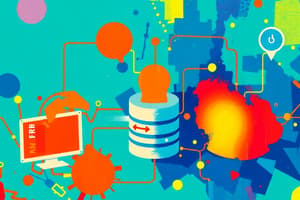Podcast
Questions and Answers
What is a key benefit of ERP systems related to data management across an organization?
What is a key benefit of ERP systems related to data management across an organization?
- Data can be accessed only by the IT department.
- Data can be entered once and used by all applications. (correct)
- Data can be entered multiple times to enhance accuracy.
- Data management is decentralized to improve user access.
Which of the following is a limitation of ERP systems concerning installation and maintenance?
Which of the following is a limitation of ERP systems concerning installation and maintenance?
- Simplified system features lead to quicker installations.
- Centralized support can eliminate the need for training.
- Increased complexity requires specialized IT staff. (correct)
- Minimal resources are needed for a successful implementation.
How does ERP contribute to the agility of an organization?
How does ERP contribute to the agility of an organization?
- By restricting information sharing among departments.
- By limiting collaboration to specific teams.
- By enabling faster responses to environmental changes. (correct)
- By increasing the time taken to process changes.
What is a common challenge in converting data from an old system to an ERP system?
What is a common challenge in converting data from an old system to an ERP system?
How does the consistency of user interfaces in ERP systems benefit organizations?
How does the consistency of user interfaces in ERP systems benefit organizations?
Which aspect of ERP implementation can lead to resistance among personnel?
Which aspect of ERP implementation can lead to resistance among personnel?
What business benefit does linking and exchanging information in real time provide with supply chain partners?
What business benefit does linking and exchanging information in real time provide with supply chain partners?
What limitation is commonly faced when consolidating IT resources in an ERP environment?
What limitation is commonly faced when consolidating IT resources in an ERP environment?
What is the main focus of e-Business technology?
What is the main focus of e-Business technology?
How does ERP technology primarily contribute to an organization?
How does ERP technology primarily contribute to an organization?
What is a key differentiator between e-Business and ERP technologies?
What is a key differentiator between e-Business and ERP technologies?
Why is e-Business considered a disruptive technology?
Why is e-Business considered a disruptive technology?
What is a common goal of ERP systems?
What is a common goal of ERP systems?
Which aspect is NOT typically associated with e-Business?
Which aspect is NOT typically associated with e-Business?
What role does ERP play in relation to early data processing efforts?
What role does ERP play in relation to early data processing efforts?
What is the primary focus of ERP systems when it comes to organizational data?
What is the primary focus of ERP systems when it comes to organizational data?
What is a primary goal of ERP systems?
What is a primary goal of ERP systems?
Which of the following best describes the components of an ERP system?
Which of the following best describes the components of an ERP system?
What is one strategy an organization can choose when implementing ERP?
What is one strategy an organization can choose when implementing ERP?
Which factor is NOT one of the components necessary for an ERP system's function?
Which factor is NOT one of the components necessary for an ERP system's function?
What does the term 'business process' refer to?
What does the term 'business process' refer to?
Which of the following is an example of a task within a sales process?
Which of the following is an example of a task within a sales process?
When considering complexity in ERP systems, which aspect contributes to it?
When considering complexity in ERP systems, which aspect contributes to it?
What role do intangible assets play in the context of new business models?
What role do intangible assets play in the context of new business models?
Flashcards are hidden until you start studying
Study Notes
Benefits and Limitations of ERP Systems
- Integration of data allows single entry for multiple applications, enhancing accuracy and data quality.
- Centralized IT support leads to improved maintenance and a deeper understanding of user needs.
- Uniform user interfaces across applications reduce training time and boost employee productivity.
- Enhanced security due to better controls and centralized management of IT resources.
- Increased complexity in installation and maintenance requires specialized IT skills and resources.
- Consolidation of IT infrastructure can be challenging and cumbersome.
- Data migration from legacy systems to new ERP can be tedious and complex.
- Resistance during retraining of staff on new ERP systems can impact productivity negatively.
Business Benefits and Limitations of ERP Systems
- Increases organizational agility, allowing prompt responses to environmental changes for growth and market retention.
- Facilitates information sharing across departments, promoting teamwork and collaboration.
- Real-time information exchange with supply chain partners improves efficiency and reduces costs.
- Enhances customer service quality through seamless information flow across all business units.
e-Business vs. ERP
- e-Business: Focuses on linking with external partners; transformative in business operations.
- ERP: Concentrates on internal integration of organizational functions; provides a central data repository.
- e-Business technologies promote market growth by reaching new customers, while ERP raises efficiency and productivity through process integration.
- e-Business is categorized as disruptive technology, whereas ERP is adaptive, integrating previous data processing efforts.
- e-Business encompasses communication, collaboration, marketing, and e-commerce, while ERP focuses on data sharing, systems integration, and decision-making improvements.
Business Process Definition
- A business process consists of a series of tasks or activities aimed at achieving a particular business objective.
- Example of sales process includes proposal sharing, quote sending, negotiations, order receipt, record updates, product/service delivery, billing, and payment processing.
ERP System Components
- ERP systems comprise hardware, software, databases, information, processes, and people, all working in tandem to improve business efficiency.
- Components:
- Hardware: Servers and peripherals essential for operations.
- Software: Operating systems and databases that enable processing.
- Information: Data sourced from both internal and external channels.
- Process: Established business procedures and policies.
- People: End users and IT staff responsible for system functionality.
- The primary goal of ERP is to convert raw data into actionable information beneficial to all organizational stakeholders.
Studying That Suits You
Use AI to generate personalized quizzes and flashcards to suit your learning preferences.




